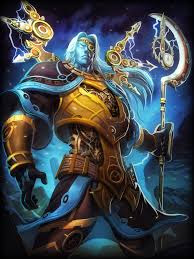CRONUS was now the lord of the universe. He sat on the highest mountain and ruled over heaven and earth with a firm hand. The other gods obeyed his will and early man worshiped him. This was man's Golden Age. Men lived happily and in peace with the gods and each other. They did not kill and they had no locks on their doors, for theft had not yet been invented.
But Cronus did not set his monstrous brothers free, and Mother Earth was angry with him and plotted his downfall. She had to wait, for no god yet born was strong enough to oppose him. But she knew that one of his sons would be stronger than he, just as Cronus had been stronger than his father. Cronus knew it too, so every time his Titaness-wife Rhea gave birth, he took the newborn god and swallowed it. With all of his offspring securely inside him, he had nothing to fear.
But Rhea mourned. Her five sisters, who had married the five other Titans, were surrounded by their Titan children, while she was all alone. When Rhea expected her sixth child, she asked Mother Earth to help her save the child from his father. That was just what Mother Earth had been waiting for. She gave her daughter whispered advice, and Rhea went away smiling.
As soon as Rhea had borne her child, the god Zeus, she hid him.
Then she wrapped a stone in baby clothes and gave it to her husband to swallow instead of her son. Cronus was fooled and swallowed the stone, and the little god Zeus was spirited away to a secret cave on the island of Crete. Old Cronus never heard the cries of his young son, for Mother Earth set noisy earth sprites outside the cave. They made such a clatter, beating their shields with their swords, that other sounds were drowned out.
But Cronus did not set his monstrous brothers free, and Mother Earth was angry with him and plotted his downfall. She had to wait, for no god yet born was strong enough to oppose him. But she knew that one of his sons would be stronger than he, just as Cronus had been stronger than his father. Cronus knew it too, so every time his Titaness-wife Rhea gave birth, he took the newborn god and swallowed it. With all of his offspring securely inside him, he had nothing to fear.
But Rhea mourned. Her five sisters, who had married the five other Titans, were surrounded by their Titan children, while she was all alone. When Rhea expected her sixth child, she asked Mother Earth to help her save the child from his father. That was just what Mother Earth had been waiting for. She gave her daughter whispered advice, and Rhea went away smiling.
As soon as Rhea had borne her child, the god Zeus, she hid him.
Then she wrapped a stone in baby clothes and gave it to her husband to swallow instead of her son. Cronus was fooled and swallowed the stone, and the little god Zeus was spirited away to a secret cave on the island of Crete. Old Cronus never heard the cries of his young son, for Mother Earth set noisy earth sprites outside the cave. They made such a clatter, beating their shields with their swords, that other sounds were drowned out.

Comments
Post a Comment